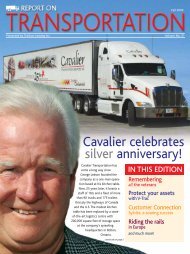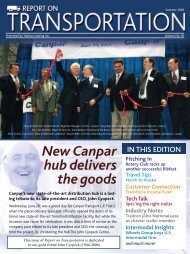Fall 2012 - Trailcon
Fall 2012 - Trailcon
Fall 2012 - Trailcon
Create successful ePaper yourself
Turn your PDF publications into a flip-book with our unique Google optimized e-Paper software.
SALES AND<br />
SOCIALIZING<br />
DON’T MIX<br />
....continued from the cover<br />
Mark Gallant, director of transportation,<br />
Home Depot Canada; Michael Buna, transportation<br />
innovation manager, Walmart<br />
Canada Corp.; Don Smith, fleet equipment<br />
manager, Canada Cartage Limited Partnership;<br />
Lance Norman, vice-president,<br />
APPS Transport Group; Daryl Clancy, vicepresident<br />
of sales, Challenger Motor Freight;<br />
and Alan Boughton, president of <strong>Trailcon</strong><br />
Leasing Inc., will participate in the session,<br />
titled “How the sales game has changed.”<br />
“In the old days, everything was face<br />
to face,” recalls Boughton. “You didn’t have<br />
cell phones or the Internet. Now our sales<br />
teams are more about RFQs, RFPs, online<br />
bidding, e-mails, and other means of electronic<br />
information exchange, so face-to-face<br />
meetings are less frequent, but become<br />
more important.”<br />
The Internet has had a tremendous impact<br />
on how sales are conducted, agrees<br />
Gallant. “We used to put out a bid package<br />
in a manual way,” he says. “We’d get the word<br />
out through many different channels, and<br />
process it somewhat manually on a desk.<br />
Now, with the Internet, there is a great ability<br />
to standardize the process of putting out a<br />
bid.” That has not only sped up cycle times<br />
dramatically, but also allows the customer<br />
to compare the fundamentals of the various<br />
bids more easily, he notes. It has increased<br />
transparency for suppliers as well. “It’s not<br />
just word of mouth, and ‘do you know three<br />
suppliers’ anymore; it’s easier to cast the net<br />
out and get the right sample of suppliers.”<br />
For their part, salespeople can use the<br />
Internet to research prospective customers.<br />
“The Internet has helped educate everyone,”<br />
says Smith. “People who were scared to ask<br />
questions before because they didn’t know<br />
can now easily learn on the Internet on their<br />
own if they care to invest the time.”<br />
After all, customers demand much more<br />
of salespeople today. “There is a much<br />
higher expectation of the quality and value<br />
“Before, you may have dealt with a department<br />
that had four people, and it now has one or<br />
two. Therefore, you have less face time, and<br />
some of the people you are dealing with are<br />
jacks of all trade.” — Alan Boughton, President, <strong>Trailcon</strong> Leasing Inc.<br />
behind the sale,” says Gallant. “There needs<br />
to be a very clear path to value and not just<br />
a path to a sale. It’s more than a glossy<br />
brochure, and it’s more than a cold call.<br />
There needs to be some thoughtfulness behind<br />
it. And of course, it has to be legitimate.<br />
You wouldn’t be selling fish to somebody<br />
who doesn’t eat fish.”<br />
Fortunately, salespeople have kept pace<br />
with this evolution, adds Gallant. “It’s a<br />
change in expectations, but I believe it’s<br />
been met with a proper change in the industry<br />
where the sales are higher quality.”<br />
The recent poor economy has brought the<br />
need for informed salespeople into even<br />
sharper focus. “People are doing more with<br />
less,” says Boughton. “Before, you may have<br />
dealt with a department that had four<br />
people, and it now has one or two. Therefore,<br />
you have less face time, and some of the people<br />
you are dealing with are jacks of all trade.”<br />
And that means that the sales staff also must<br />
wear different hats and be more knowledgeable<br />
about all aspects of the process. Otherwise,<br />
the customer is more likely to base his<br />
or her decision solely on price.<br />
That tendency is a continuing challenge<br />
for suppliers. “The economic crisis has created<br />
an industry of people scared to make<br />
long-term commitments,” says Smith. Many,<br />
he argues, are concerned only with shortterm<br />
profit, rather than long-term success.<br />
“The cheapest supplier tends to get the business.<br />
It may win you the business, but will it<br />
help you get a contract extension” he asks.<br />
Boughton agrees. “Changes in personnel<br />
and business decisions driven by the lowestcost<br />
mentality have forced a dramatic shift<br />
in the manner in which companies represent<br />
and deliver their products and services.<br />
I have found it much easier to sell a superior<br />
service, as no amount of lunches or golf<br />
games could ever overcome poor service or<br />
inferior trailer quality.”<br />
4 REPORT on TRANSPORTATION






